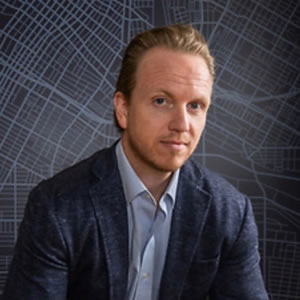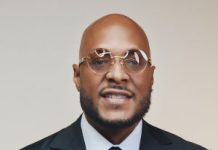Drew Messer Podcast Transcript
Drew Messer joins host Brian Thomas on The Digital Executive Podcast.
Welcome to Coruzant Technologies, home of The Digital Executive podcast.
Brian Thomas: Welcome to The Digital Executive. Today’s guest is Drew Messer. Drew Messer is the CEO and co-founder of Urban SDK. He drives Urban SDK’s mission to revolutionize local government through AI shaping the company’s strategic direction and overseeing key investor relations. His efforts ensure Urban SDK plays a vital role in transforming government operations and policy by leveraging his deep experience in lobbying and political administration.
Drew is a recipient of the EFF Entrepreneur and Job Growth Award from the state of Florida awarded for leadership and job growth and innovation.
Well, good afternoon, Drew. Welcome to the show!
Drew Messer: Thank you, Brian. Thank you for the opportunity. Looking forward to this discussion.
Brian Thomas: Absolutely, my friend. I appreciate it. And you’re hailing out of Florida at the moment? I’m in Kansas City. We’re an hour apart. Do like to traverse the globe when I do these podcasts.
So again, appreciate you making the time. Drew, we’re going to jump into your first question. You’ve been recognized for job growth and innovation by the state of Florida. What was the origin story behind Urban SDK and what problem were you most passionate about solving when you launched?
Drew Messer: Well, thank you Brian.
Again, thank you for the opportunity today to provide some background on business and ultimately the mission that we’re on to achieve. To just provide a little kind of background to answering that question. I have, uh, kind of been born and raised in a family with political involvement, so I’ve been waving signs, knocking on doors since I was a kid, went off to Liberty University School of Law, and then ultimately built my early career in.
Being a part of the kind of the political apparatus or the government landscape, if you will, working on city council campaigns to governor campaigns to presidentials and navigating legislative issues at the government level, and then ultimately helping companies navigate contracting opportunities. And ultimately came across the opportunity when the US DOT released their Smart Cities Challenge grant.
That was back in 2016, where they basically said, here’s an opportunity for any city. To win $50 million with the best ideas on how to modernize local government services, particularly associated to transportation and mobility. And at the time, I was a consultant and was pretty inspired by the call to action, the opportunity, me and my co-founder.
Actually, FOIA requested all of those city applications. There are 76 of ’em in the entire country, and we read them thoroughly and we walked away with a, a premise, a thesis conviction that most of what local state governments were acknowledging were these new data sources were coming online. And those data sources could be relevant and applicable to daily decisions, annual decisions, daily operations.
And they were acknowledging in these applications that they didn’t have the skillset or the tools to be able to collect that information, clean it, and then ultimately use it in an effective way. And we kind of studied the private marketplace and concluded there wasn’t a company who was dedicated to building a platform designed around.
Data management for state and local government. And so in March of 2018, we actually formed the business with this idea that we’re gonna build a data management platform for state and local government agencies. And it was that plus a combination of a piece of legislation that was passed in 2016. It was a bipartisan piece of legislation passed in congress.
It was called the Evidence-Based Policy Act, and the Policy Act basically said that every federal agency was now required to collect machine readable information and pass that information on to Congress prior to making any legislative decisions. You know, I think the combination of the Smart Cities Challenge grant from US DOT plus that piece of congressional legislation really led us to this conviction that we can reimagine what Government 2.0 looks like.
And we can make better, more quality decisions for our local communities because now data is available and we can associate those to the critical decisions that our government agencies are making every day. And that, that really was the launching point for urban SDK. And we’ve grown significantly since we started the business and we’re a VC backed business.
And uh, today we’re in 34 different states. We have over 250 customers. We’re primarily serving police departments, public works, and dots. And, uh, ultimately we’re here to help them understand the data available to ’em so they can make better decisions daily for our communities.
Brian Thomas: That’s amazing. I love the backstory.
I really do. And of course, you’re influenced early on in your career or as growing up as you had mentioned, being in politics, knocking on doors, volunteering community, et cetera. I think that’s pretty cool. But with this background, you jumped into this opportunity to serve your community now states and country through building your platform with this building, this amazing data management platform, which allows for better decision making, obviously.
This further moves along that Smart cities legislation that everybody has jumped on board in the last few years, so appreciate the backstory. Drew Urban SDK focuses on geospatial AI for local governments. Can you walk us through a real world example of how your platform has helped the city make a critical decision more efficiently or accurately?
Drew Messer: Yes, I can to kind of provide some context there. What has traditionally been the practice at state and local governments for kind of understanding roads or understanding the activity on roads, which obviously is a critical piece of infrastructure and, and all of our local communities, is that they would typically lay down.
A rubber tube, I’m sure you’ve probably driven over one of those in the past. And those rubber tubes count cars and detect speed, and they’re usually laid down on the street for a few days, and that exercise traditionally costs about 10 to $15,000 a piece. And it takes 30 to 45 days to collect that information and ultimately come back with this PDF of a traffic study on a road.
And what we have said is that’s a kind of a, an old and archaic way of understanding the activity and the efficiency and the safety on our road network. And so what we have decided to do is introduce a new way of understanding that entire road network. So we collect data from every single road. In a city’s jurisdiction, not just a handful.
We collect it from 365 days outta the year, and then we stack data layers on top of each other to understand the more granular minute metrics that would come out of it, and we can deliver all of that for. What is typically 10 cents on the traditional dollar. So if they were spending $400,000 a year on annual traffic studies, we’re able to deliver that in an annual license for $40,000 a year.
And, uh, where they were typically able to only study five to 15% of their entire road network based on kind of the limitations of their budget. They’re now able to get their hands wrapped around every single road within their jurisdiction. And so I think the ROI has been pretty significant. I think that’s why we’re seeing so much growth.
It gives these decision makers so much more information and knowledge and quick access to that information to make really critical decisions. Obviously, an example of that would be if you have dangerous roads with historical traffic incidents or fatalities, the city is tasked to make that road better and they would traditionally have to go out there and and collect this information, and a year’s time may pass, and they ultimately come up with a solution to calm traffic down on that particular road.
Maybe they introduce a speed bump or a traffic signal, or a roundabout, whatever that solution may be. What we are able to do is say, Hey, instead of spending all those dollars on data collection, spend a fraction of that on data collection and then reallocate those taxpayer dollars to actually solving those safety issues or those inefficient issues on the road network.
So that would kind of be for the public work side. On the public safety side, it allows police officers to wake up, particularly those who are in the patrol department, to wake up every day and know where they should be monitoring. Speeding issues or safety issues on the road. And uh, what we had found is there was usually kind of this tribal knowledge that, you know, these are the bad roads, we should go focus on them.
But when we actually started delivering data and information from the roads to these police officers, they started going to areas that they had traditionally not monitored. And it has given them the ability to be present, which obviously helps people slow down and be more safe in those environments. I just think the quick access.
To their fingertips is what allowed people at the city level to just make more critical, more efficient and affordable decisions.
Brian Thomas: Thank you. I really appreciate that. Just to dive into that a little bit, you know, talking about inefficiencies, understanding on the transportation side, the old way was slow in efficient and expensive, really couldn’t get very good road data.
Of course. Right? And you’d mentioned a statistics like they were only effectively being able to gather about five to 15% of the community data on those roads, which is amazing. But your platform. Obviously collects a lot more data points and is able to deliver much more data much faster. And of course, 24 7, 365, which I really, really like.
And then of course you have delved into the public safety side of it, which I think is also helpful to bring our communities operate more efficiently and more safer. I appreciate that. My next question for you, drew, is your platform is used by over 250 local governments. What are the most common issues these municipalities are trying to solve, and how does urban SDK adapt to such diverse needs?
Drew Messer: Great question. I think you, again, you kind of take a step back and you look at what’s the responsibility of all of these government unique government entities or agencies. Over this really important and critical asset like the roads. And if you look at that from a whole of government perspective, you obviously you’ll see the legislative branch or what you would call a city council group of members, you know, really responsible for creating the regulatory environment around the road.
And then. Obviously approving and providing the budget to make those roads safer. And then you look across the board at Public Works departments or dots, and they’re tasked with designing and building and operating and maintaining those roads in an efficient manner. And then you look across the other side of the aisle and you’ll see.
Public safety, mostly police departments that are responsible for enforcing the regulations on that road and, and making our roads more safe or even responding to emergency events that occurred on the road. And then you can look into the transit agencies who have been tasked by our governments to provide affordable public transportation in an equitable way across all our communities.
And, and so my point is, you’ve got a variety of sanctioned government entities with. Jurisdictional responsibilities over this asset. And they have traditionally had their own siloed data source to understand that asset. And while they may be making decisions that are connected to each other, they weren’t making decisions that had a cohesive, comprehensive, kind of single pane of glass of information to make those decisions more effectively in a whole of government type of perspective.
And I think that is ultimately what we are building. That’s what we are. Set out to accomplish is a comprehensive view of what’s actually happening on the road designed to deliver that in useful solutions to each of those bodies or entities that are responsible for managing this road infrastructure.
And I think because of that vision and what we’re trying to do from a comprehensive level, ultimately we’re gonna have better, safer, more efficient roads in the future because of it.
Brian Thomas: I like that. I really do. And there are so many challenges. You know, I’ve spent some time in local government as well.
There’s so many items to address with transportation and roads, as you mentioned, building, managing, repairing, planning, budget, safety, everything that goes into it. But having a platform like Urban SDK provides robust information which provides local governments with better data to make those data driven decisions.
So I appreciate that. Drew, the last question of the day. Urban, SDK has a strong focus on traffic safety and infrastructure. What trends are you seeing in smart city planning and how does data-driven decision making change outcomes
Drew Messer: At the highest level, the broad trend is what was traditionally static, not smart infrastructure.
Is now becoming reimagined and you’re seeing Infrastructure 2.0 being built and delivered. And when I say that, what I’m saying is they’re embedding, you know, sensors or the capacity to collect information off of this new infrastructure that, that we’re building. And so the physical world can now be measured.
The data from the physical world can be collected and represented in a piece of software like Urban SDK. Obviously, the broadest trend for smart cities is that if we can understand cities from a metadata perspective, a very granular data perspective, then we can clearly begin to measure. How to get that city to perform better, and ultimately that will lead to better policy, budgeting and operational decisions.
So at the highest level, the biggest trend obviously is data is becoming ubiquitous. We have access to this data. Now let’s integrate that into kind of our governing layer. And rebuild that municipal and state code that we are kind of adhering to with the use and advancement of this information that’s now available to us.
And then obviously that has a direct connection to how we make decisions. Historically, you would see citizens of a particular region or locality would elect a body of leaders, city council members, state reps, et cetera, and those leaders would be tasked to accomplish the objectives of that city. And so much of that is.
Making very critical budgeting decisions on where to allocate dollars to improve infrastructure, and to a large degree, I think people tried to do their best, but they have obviously personal bias applied to that decision paradigm. What you can do now is kind of take that personal bias out and really drive critical public decisions off of relevant, reliable information.
Hopefully that is the trend that we continue to see over time when it comes to smart cities, is that it can be a non-biased, data-driven, evidence-based governing layer that gets introduced at all levels of the US government.
Brian Thomas: Thank you. Really appreciate that. And you highlighted a few things I’ll just throw out there.
You know, the old way, as you said, to measure improvements to city infrastructure is very outdated, antiquated, very manual based. A lot of estimations in there, but with the infrastructure 2.0. As we’re seeing as this is being built out, has much more capacity to collect more information, more data points can be collected to enable better decision making.
And of course, I think the important part, right, it’s all in the data. And you mentioned about data removes that personal bias because people do tend to lean on their bias or their past experiences, and with the data right there in front of ’em, it just takes that all out and it makes it much more easier to make those decisions.
So appreciate that. Drew, it was such a pleasure having you on today, and I look forward to speaking with you real soon.
Drew Messer: Well, thank you, Brian. I appreciate the opportunity. It would be important for me to mention that the business has experienced an enormous amount of success in a short period of time, and we are very excited about the future.
We are bullish about the future, but so much of our success in my mind has been dependent on the blessing of God on our business. And it would obviously be important for me to mention that there’s been so many times in this business. I thought, man, are we gonna make it through? And we have. And I think that it’s because of his faithfulness and, and blessing the business.
And so I, wanna be mindful of mentioning that obviously at, at the tail end here. Thank you for the opportunity and would welcome, you know, continue conversations if you ever need it.
Brian Thomas: Bye for now.
Drew Messer Podcast Transcript. Listen to the audio on the guest’s Podcast Page.











